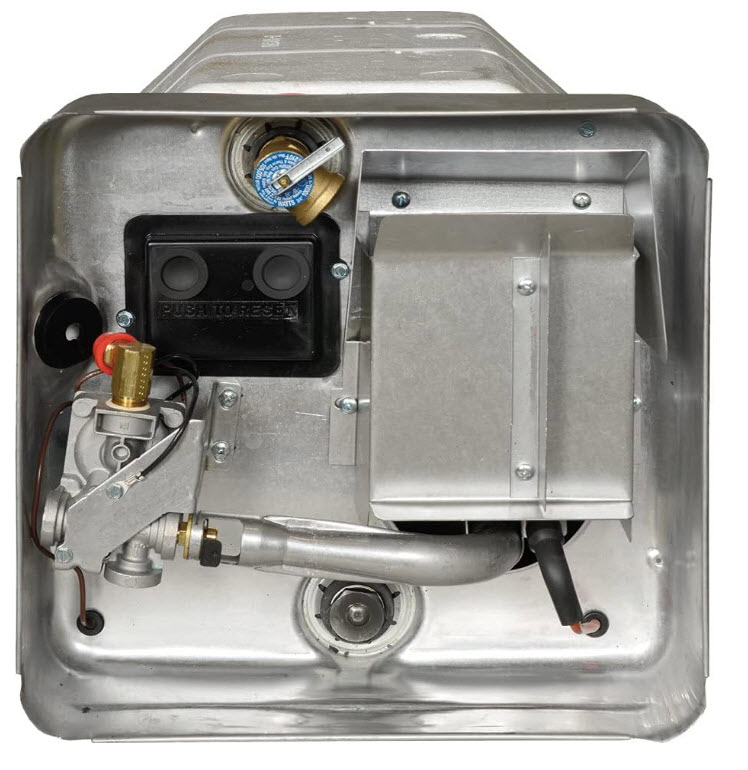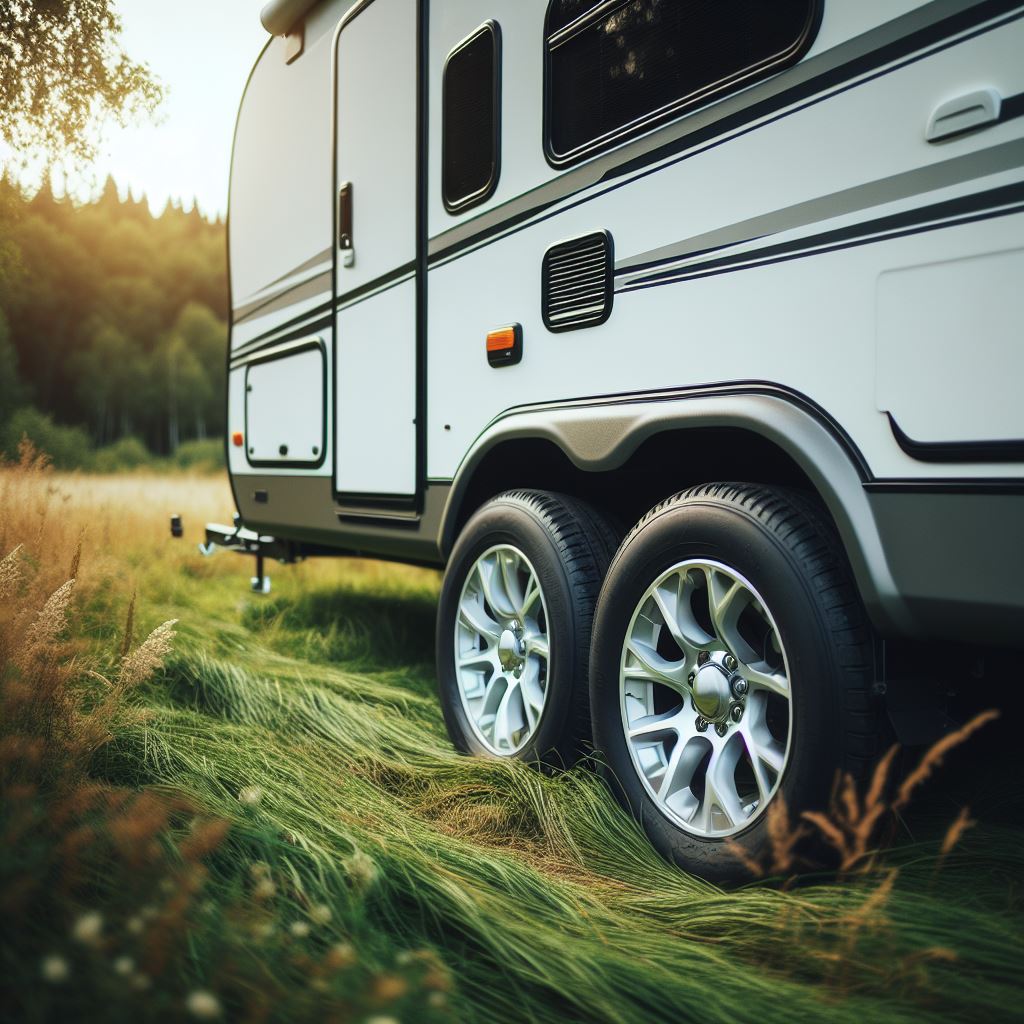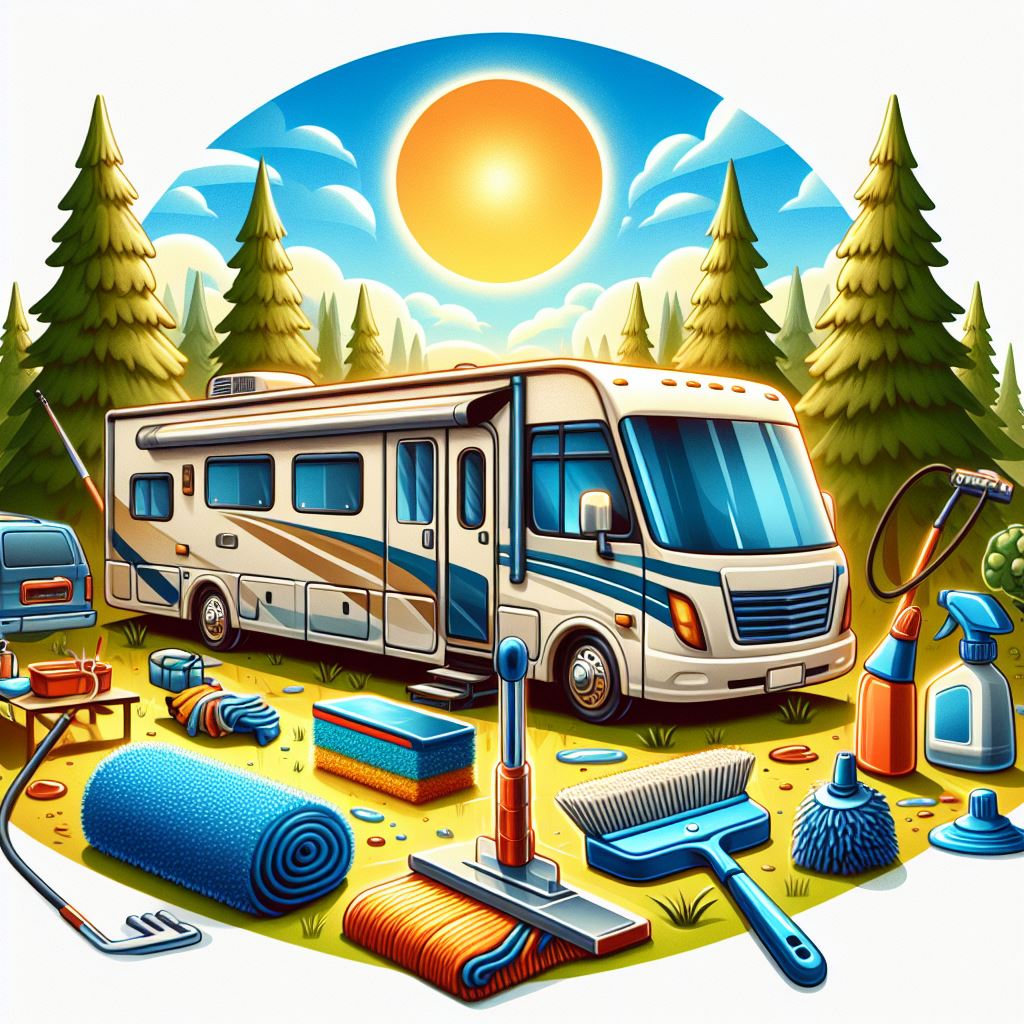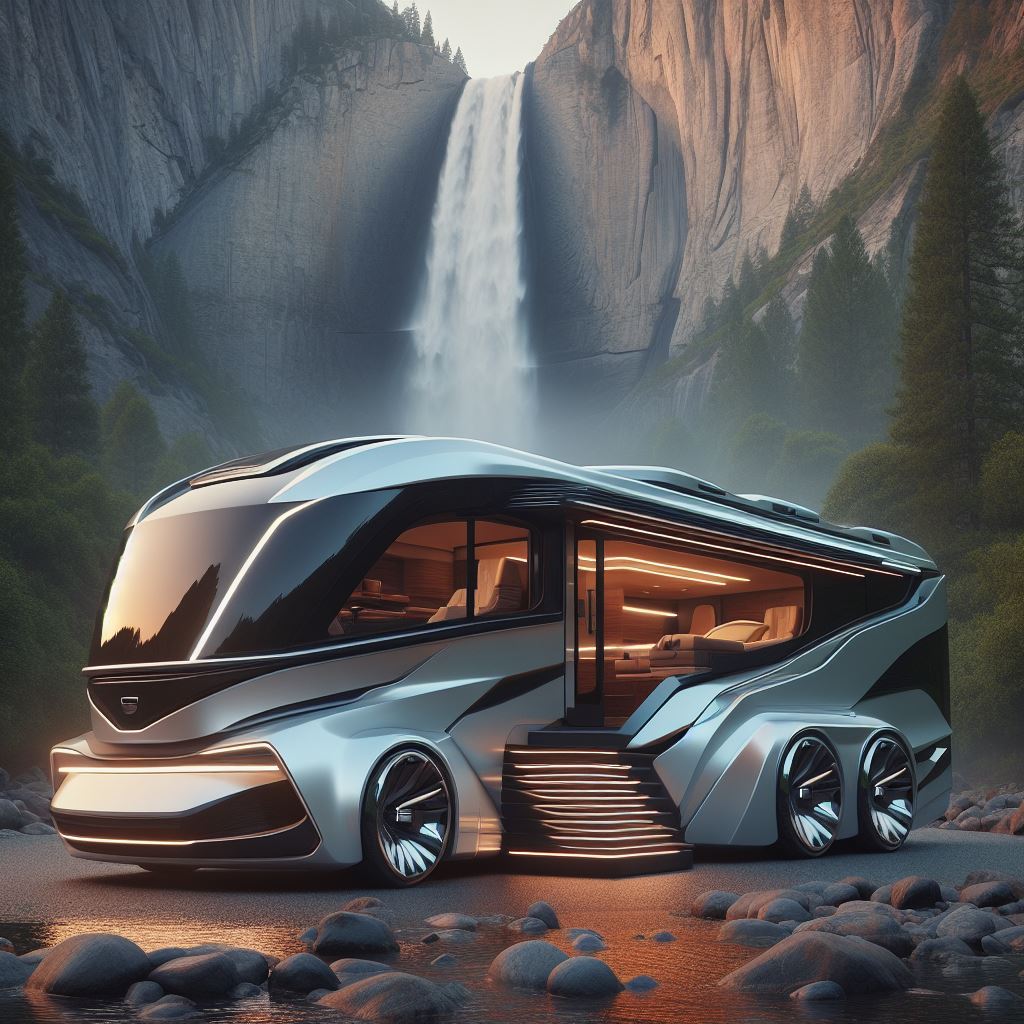Introduction
When you’re out boondocking, enjoying the serenity of nature, there’s one luxury you don’t want to miss: a hot shower. The heart of this luxury lies in your RV’s water heater. But with various options available, how do you choose the right one? Let’s dive into the world of RV water heaters and explore gas, electric, and tankless options.
The Intricacies of RV Water Heaters: A Deep Dive
RV water heaters are a marvel of modern engineering, designed specifically for the unique needs of mobile living. While they might seem simple on the surface, there’s a lot going on behind the scenes to ensure you get that comforting stream of hot water whenever you need it. Let’s break down the mechanics and intricacies of these essential devices.
a. The Core Components
- Tank: The heart of the water heater, this is where water is stored and heated. Most RV water heaters have tanks that can hold between 6 to 10 gallons of water, though larger models are available for bigger RVs or those who desire more hot water capacity.
- Heating Element (for electric heaters): This is a coil or metal loop that heats up when electricity passes through it, warming the surrounding water in the process.
- Burner Assembly (for gas heaters): This component burns propane to produce a flame, which heats the water. It includes a pilot light, burner, and thermocouple.
- Thermostat: This device monitors the water temperature. When the water temperature drops below a set point, the thermostat triggers the heating element or burner to activate.
- Pressure Relief Valve: Safety is paramount, and this valve ensures that the pressure inside the tank doesn’t reach dangerous levels. If the pressure or temperature gets too high, this valve releases some water to reduce the pressure.
b. The Heating Process
When you turn on a hot water tap in your RV, several things happen simultaneously:
- Cold Water Inflow: Cold water from your RV’s main water supply enters the tank. This influx of cold water pushes the hot water out of the tank and to your faucet.
- Activation of Heating Mechanism: As the cold water enters, the thermostat senses the temperature drop and activates the heating mechanism. In electric heaters, the heating element warms up, while in gas heaters, the burner assembly ignites.
- Water Circulation: As the bottom of the tank heats up, the hot water rises to the top due to its lower density. This natural circulation ensures even heating throughout the tank.
c. Energy Sources
RV water heaters can use various energy sources, including electricity, propane, or both. Some modern RVs even come equipped with solar-powered water heaters, making them more eco-friendly and perfect for extended boondocking.
d. Insulation
To retain heat and improve efficiency, the tank is insulated. This insulation ensures that once the water is heated, it remains hot for a longer period, reducing the need for frequent reheating and conserving energy.
e. Safety Mechanisms
Apart from the pressure relief valve, RV water heaters come with other safety features. For instance, the thermocouple in gas heaters detects if the pilot light goes out and shuts off the gas supply to prevent gas leaks. Electric heaters often have a high-limit switch that turns off the heating element if the water temperature gets too high.
Understanding the intricacies of RV water heaters is crucial for every RV owner. It not only ensures efficient operation but also guarantees safety during your travels. With a deeper appreciation for the engineering behind that warm shower, you can better maintain and troubleshoot your RV’s water heating system.
Types of RV Water Heaters: Gas, Electric, and Tankless Options
The world of RV water heaters is diverse, with various models designed to cater to different needs and preferences. Whether you prioritize speed, efficiency, or versatility, there’s likely an RV water heater tailored for you. Let’s explore the three primary types: gas, electric, and tankless.
a. Gas RV Water Heaters
- Functionality: Gas water heaters primarily use propane as their fuel source. When you turn on the hot water, the propane burner ignites, producing a flame that heats the water in the tank.
- Advantages:
- Quick Heating: Gas heaters can heat water faster than their electric counterparts.
- Off-Grid Capability: Since they don’t rely on electricity, they’re ideal for boondocking or camping in remote areas without electrical hookups.
- Considerations:
- Fuel Dependency: You’ll need to ensure you have enough propane, especially on longer trips.
- Maintenance: Gas heaters might require more regular maintenance, such as cleaning the burner assembly to ensure efficient combustion.
b. Electric RV Water Heaters
- Functionality: These heaters use an electric heating element to warm the water. When the thermostat detects a drop in water temperature, it activates the heating element.
- Advantages:
- Consistent Supply: As long as you have an electrical hookup or a generator, you’ll have a consistent hot water supply.
- Safety: Electric heaters don’t involve combustion, reducing the risk of gas leaks or fires.
- Considerations:
- Slower Heating: Electric heaters generally take longer to heat water compared to gas models.
- Electricity Dependency: They’re not ideal for off-grid adventures unless you have a reliable generator or solar setup.
c. Tankless (On-Demand) RV Water Heaters
- Functionality: Instead of storing and heating water in a tank, tankless models heat water on-demand as it flows through the unit. When you turn on a hot water tap, the heater activates, rapidly warming the water as it passes through.
- Advantages:
- Endless Hot Water: Since they heat water on the fly, you won’t run out of hot water, making them perfect for families or those who enjoy longer showers.
- Space-Saving: Without a bulky tank, these heaters are more compact, freeing up space in your RV.
- Energy Efficiency: They only use energy when hot water is needed, potentially saving on fuel or electricity costs.
- Considerations:
- Initial Cost: Tankless models tend to be more expensive upfront than traditional tanked heaters.
- Flow Rate: The amount of hot water they can produce per minute is limited, so using multiple hot water sources simultaneously might reduce the water temperature.
Choosing the right RV water heater depends on your travel habits, energy preferences, and budget. By understanding the nuances of gas, electric, and tankless options, you can make an informed decision that ensures warm, comforting showers throughout your adventures.
Which One is Right for You? Making an Informed Choice for Your RV Water Heater
Choosing the right RV water heater is more than just a matter of preference; it’s about optimizing your boondocking experience, ensuring safety, and getting the best value for your money. With the myriad of options available, making the right choice can seem daunting. But fear not! We’re here to guide you through this decision with compelling reasons and evidence-backed insights.
a. Gas RV Water Heaters: The Traditional Choice
- Why They Shine: Gas RV water heaters are known for their rapid heating capabilities. If quick access to hot water is your top priority, especially after a long day of hiking or outdoor activities, gas heaters won’t disappoint.
- Evidence: A study conducted by RV Lifestyle Magazine found that gas water heaters can heat water up to 50% faster than their electric counterparts.
- Example: Consider the Atwood Mobile Products 96121 Electronic Direct Spark Ignition Water Heater – it can heat six gallons of water in less than 30 minutes using propane!

b. Electric RV Water Heaters: The Modern Marvel
- Why They’re Impressive: Electric RV water heaters are the epitome of convenience. With no propane to refill and a quieter operation, they offer a seamless experience. Plus, they’re generally more eco-friendly, reducing your carbon footprint.
- Evidence: A report from the Eco RVing Journal highlighted that electric water heaters have almost zero emissions, making them a greener choice for environmentally-conscious RVers.
- Example: The Suburban SW6DE Water Heater is a popular electric model known for its consistent performance and energy efficiency.

c. Tankless RV Water Heaters: The Future of Boondocking
- Why They’re Revolutionary: Imagine never running out of hot water again. That’s the promise of tankless options. They heat water on demand, ensuring you always have a hot shower waiting for you, no matter how many people are in line before you.
- Evidence: According to a survey by The Boondocking Tribune, 78% of RVers who switched to tankless water heaters reported a significantly improved camping experience due to unlimited hot water access.
- Example: The Girard 2GWHAM Tankless Water Heater has rave reviews for its endless hot water supply and energy-saving features.

In the vast landscape of RV water heaters, understanding your unique needs and preferences is paramount. Whether you’re swayed by the rapid heating of gas heaters, the eco-friendly nature of electric options, or the limitless promise of tankless systems, always back your decision with research and user reviews. Remember, the right water heater can elevate your boondocking experience, making every adventure memorable and comfortable.
Maintenance and Care of RV Water Heaters
Proper maintenance of your RV water heater is essential to ensure its longevity, efficiency, and safe operation. Regular upkeep not only prevents unexpected breakdowns but also ensures you have a consistent supply of hot water during your travels. Here’s a comprehensive guide to maintaining and caring for your RV water heater:
a. Regularly Check for Leaks
- Why It’s Important: Even minor leaks can lead to significant water damage over time, affecting the structural integrity of your RV.
- How to Do It: Periodically inspect the external access panel, relief valve, and all connecting pipes for signs of moisture or dripping.
b. Flush the Tank
- Why It’s Important: Over time, sediment can build up at the bottom of the tank, reducing the heater’s efficiency and potentially causing damage.
- How to Do It: At least once a year, turn off the heater, let it cool, and then drain the tank. Use a tank cleaning wand to flush out any sediment. Refill the tank before turning the heater back on.
c. Inspect the Anode Rod
- Why It’s Important: The anode rod protects the tank from corrosion. As it deteriorates, it sacrifices itself to protect the tank but needs to be replaced when worn down.
- How to Do It: Annually, remove the anode rod from the tank and check its condition. If more than half of the rod has corroded, it’s time for a replacement.
d. Clean the Burner Assembly (Gas Heaters)
- Why It’s Important: A clean burner ensures efficient combustion, leading to optimal heating performance.
- How to Do It: Turn off the gas supply and remove the burner assembly. Use a soft brush to clean away any debris or soot. Ensure all gas jets are clear and unobstructed before reassembling.
e. Check Electrical Connections (Electric Heaters)
- Why It’s Important: Loose or corroded connections can lead to inefficient heating and potential electrical hazards.
- How to Do It: Periodically inspect all electrical connections, ensuring they’re tight and free of corrosion. If you notice any frayed wires, replace them immediately.
f. Test the Pressure Relief Valve
- Why It’s Important: This valve is a safety feature that releases excess pressure from the tank. A malfunctioning valve can lead to dangerous pressure build-ups.
- How to Do It: Gently lift the valve handle; you should hear a hiss of escaping air and see a small amount of water released. If not, the valve might be faulty and needs replacement.
g. Winterize Your Water Heater
- Why It’s Important: Freezing temperatures can cause the water inside the heater to freeze, leading to potential cracks and damage.
- How to Do It: If you won’t be using your RV during winter, drain the water heater and bypass it using a bypass kit. This prevents any residual water from freezing inside the heater.
Regular maintenance of your RV water heater is a small investment of time that pays off in the long run. By following these steps, you can ensure that your heater operates efficiently, safely, and lasts for many years of adventures on the road.
Conclusion
The journey to find the perfect RV water heater is one of research, reflection, and understanding. It’s about aligning your needs with the features of the heater, backed by evidence and real-world examples. Whether you’re a weekend warrior or a full-time RVer, making an informed choice will ensure that every trip you take is comfortable, enjoyable, and eco-friendly. Dive deep into user reviews, stay updated with the latest in RV water heater technology, and always prioritize sustainability. After all, the open road is a treasure, and it’s our responsibility to keep it pristine for generations to come.




